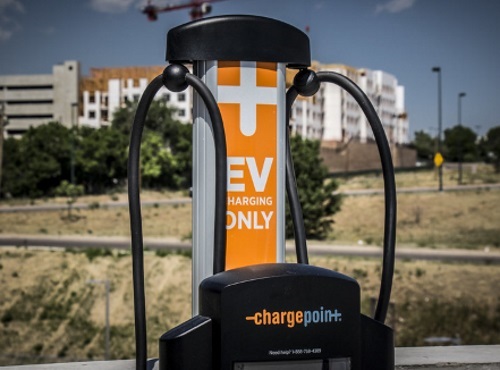While the American Association of State Highway and Transportation Officials supports President Biden’s “ambitious goal” of building a new national network of 500,000 electric vehicle or EV chargers by 2030, the organization cautions that “many challenges must be overcome, both technical and logistical, in order to make this goal a reality.”
[Above photo by the Colorado DOT]
The establishment of such a network is a key part of the $1.2 trillion Infrastructure Investment and Jobs Act or IIJA signed into law in November 2021, which sets aside $5 billion in formula funding specifically to support EV charging infrastructure projects.
In a letter sent to the U.S. Department of Transportation on January 7, AASHTO said some of the major challenges facing this administration’s EV charging push is overall national electrical grid capacity as well as the grid’s proximity to potential charging stations, especially in rural and underserved areas.
Industrial capacity to meet the sudden increase in demand for EV supply equipment, along with the need to coordinate – on a “huge scale” – with business models and supply chain of “non-traditional” transportation sector stakeholders, are also big concerns, AASHTO said.
Yet one of the biggest short-term challenges facing Biden’s EV effort – with the “greatest potential” to affect the initial deployment of chargers around the country – is the “reasonable and appropriate” application of Buy America requirements to the EV infrastructure industry, the organization emphasized.
AASHTO strongly recommended in its letter a “staged” or incremental approach to the application of Buy America requirements as they relate to EV supply equipment during the initial implementation period of the IIJA in order to facilitate efficient and effective deployment in the first few years.
“A reasonable, practical, step-wise approach will ensure progress in deploying EV infrastructure while coaxing the industry along to full compliance within a defined period of time,” the organization said. “State DOTs are concerned that the approach taken to Buy America has the potential to upset implementation and increase market volatility.”
In addition, EV infrastructure providers need “widespread education” on federal transportation regulations in general, in addition to the Buy America requirements with which they must now comply. “Many of the subcontractors receiving funds for EV infrastructure will be nontraditional, non-transportation-related private-sector entities that are not familiar with and, in many cases, unable to accommodate the myriad federal-aid requirements attached to the IIJA funding,” AASHTO warned.
The organization pointed out that eliminating the interpretation of Buy America at the state DOT/Federal Highway Administration Division Office level by making compliance determinations at the national level and disseminating this information to the states would be the “preferred solution” to this issue.
“The development by USDOT of a national, pre-approved list of EV equipment vendors that are certified Buy America would ensure that the same review and certification processes do not need to be replicated in each individual state, and would also ensure consistent implementation across the country,” AASHTO added.

